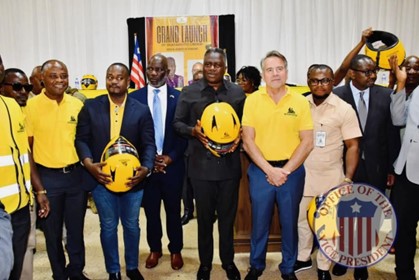Vice President Jeremiah Kpan Koung of Liberia, at the launch of the OKADA-MOTO app, a platform designed to empower commercial motorcyclists, shared his inspiring journey from humble beginnings as a money exchanger to the nation’s second-highest office. His narrative emphasized the power of determination, strategic planning, and continuous self-improvement, serving as a motivational beacon for the motorcyclists he addressed. The app launch, attended by officials, motorcycle unions, and the public, marked a significant step towards improving the livelihoods and safety of motorcyclists in Liberia.
The OKADA-MOTO app is multifaceted in its approach to empowering motorcyclists. It provides a platform for enhanced financial literacy, access to job training programs, savings plans, and networking opportunities with potential employers. This comprehensive approach aims to equip riders with the skills and resources necessary to transition from motorcycle riding to more sustainable and financially rewarding careers. The Vice President stressed that while motorcycle riding can provide income, it should be viewed as a stepping stone to greater opportunities, encouraging riders to invest wisely and plan for their future. The app’s financial management tools are designed to assist riders in managing their earnings effectively, fostering financial stability and long-term security.
Beyond economic empowerment, OKADA-MOTO also prioritizes road safety. The app incorporates features that promote safer road practices, equipping riders with the knowledge and tools to navigate the streets more securely. This focus on safety underscores the importance of responsible riding practices and the shared responsibility of all road users in creating a safer traffic environment. Vice President Koung urged both motorcyclists and drivers of larger vehicles to exercise caution and respect each other on the roads, thereby reducing accidents and improving overall road safety.
During the launch, Vice President Koung drew parallels between his own diverse career path, including experiences in money exchange and taxi driving, and the potential for growth available to motorcyclists. He emphasized the importance of focus, dedication, and strategic planning in any venture, highlighting how these qualities contributed to his own success. He urged motorcyclists to adopt a similar mindset, emphasizing that through diligent management of their earnings, coupled with a commitment to personal and professional development, they could build lasting careers and significantly improve their livelihoods. He challenged them to view their current work as a stepping stone towards achieving greater goals.
The Vice President also called for unity and collaboration among motorcycle unions. He stressed the importance of a collective voice in advocating for better working conditions, enhanced safety measures, and expanded opportunities for motorcyclists. By working together, unions can wield greater influence in policy changes, negotiations for better wages, and providing essential training and support for their members. This unified approach is crucial for ensuring sustainable growth and development within the motorcycle transportation sector. Koung’s message resonated with the audience, emphasizing the power of collective action in driving positive change.
Dr. Mohammed Sumaila, CEO of the company behind the OKADA-MOTO app, explained the app’s functionality and its broader vision. The app streamlines the process of booking motorcycle rides, offering a convenient and efficient transportation solution. In addition to facilitating easier movement and navigation, the app integrates features designed to empower riders. These features focus on financial management, skill development, and fostering a sense of community among motorcyclists. The app represents a significant step towards modernizing the motorcycle transportation sector, providing riders with the tools and support they need to thrive both professionally and personally. The OKADA-MOTO app holds the promise of not only transforming transportation but also empowering a significant segment of the Liberian workforce.














